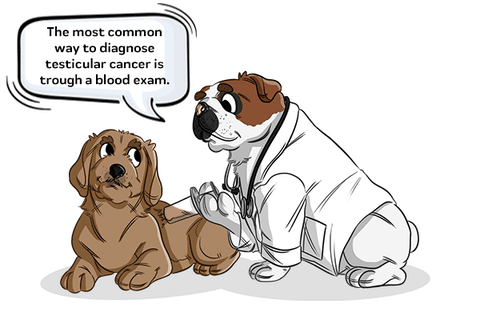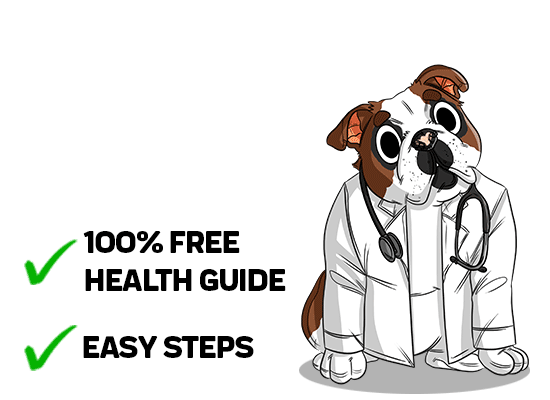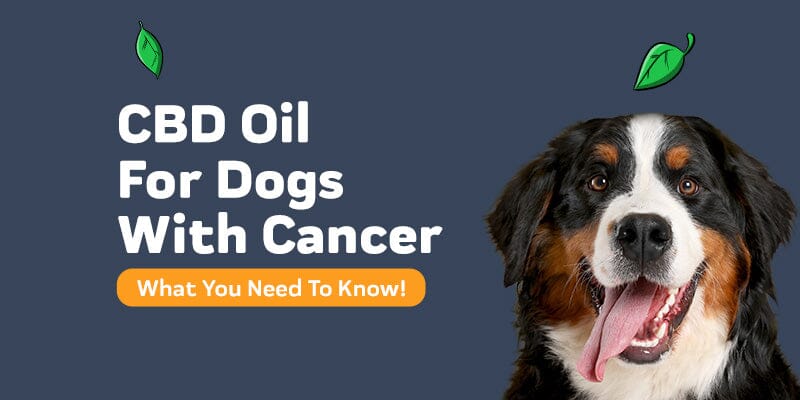- Three common types of testicular tumors in dogs
- Symptoms of Testicular Tumor in Dogs
- How Testicular Cancer is Diagnosed
- Can Dogs Get Testicular Cancer?
- How to Treat Testicular Cancer in Dogs

With any sort of illness, being aware of the cause can bring a lot of understanding and comfort because you're not left with an unanswered question. Unfortunately, when it comes to current cause of testicular cancer in intact male dogs, the cause is not fully known.
Before we say anything further, it's important to note that prostate cancer and current cause of testicular cancer are two different types of cancer in male dogs. Since the prostate gland is close to the testicles, it is not likely to develop / rare that a dog will initially receive a diagnosis of prostate cancer that is later revealed as testicular cancer.
However, despite a lack of clarity surrounding the cause of testicular tumors, there is still a lot of public information about cancer in male canine testicles, including the types of canine testicular tumors.
Three common types of testicular tumors in dogs.
Interstitial Cell Tumors
The main types of testicular tumors differentiating factor between these cell tumors and seminomas is their origin. They all likely to develop from different sources. Interstitial Leydig cell tumors, for example, stem from Leydig cells, which are responsible for producing testosterone in dogs when a hormone called LH is present. These tumors are the more common type of cell tumors in canine testicles.
Sertoli Cell Tumors
Sertoli cell tumors stem from canine Sertoli cells, which aid in the production of sperm in male canine testicles. A rare form of cancer, Sertoli cell tumors are found in the testicles and can result in infertility.
Similar to Leydig cells, Sertoli cell tumors arise in situations where a hormone known as FSH is present.
Seminomas
Another types of tumors, Seminomas come from the cells that produce sperm in a male dog's reproductive system. These cells are known as germ cells. In the formative stages, testicular cell tumors and seminomas are different, but they share many similar side effects.
Symptoms of Testicular Tumor in Dogs
Testicular tumors lead to many physical symptoms that reveal themselves over time. One main symptom of a testicular tumor is weight loss. Another side effect of testicular tumors is symmetrical hair loss, and a third symptom is the swelling of mammary glands.
Symptoms that show when they develop a tumor can include: being lethargic and refusing food; having pain when walking or sitting down; swelling on one side of his body under the rib cage. The veterinarian will do a physical examination look at your pooch's testicles while conducting an exam using X-rays and ultrasounds — spotting any irregularities is crucial because if left untreated this type cancer has potential growth rates up into 50%.
Dogs that develop testicular tumors can also cause the lymph nodes to swell up and make dogs look puffy. Lymph nodes are located all over a dog's body, and the swelling usually occurs near the location of the cancerous cells, so keep an eye out for puffiness near your dog's testicles.

How Testicular Cancer is Diagnosed
When the number of WBC is lower than usual, it might indicate that cancer has entered into the canine's bone marrow. Even if it’s not showing signs of disease, the low WBC count is worth noting. There are many different ways that veterinarians check male dogs for testicular cancer. One of the most common methods of diagnosing this is by ordering a complete blood count exam. A blood count of the white blood cells (WBC) speaks volumes when diagnosing canine testicular cancer.
Other testing options for formally diagnosing cancer of the testicles in dogs include —
- A urinalysis
- A chest exam
- An abdominal radiograph
- Other types of X-rays
- An abdominal ultrasound
- Fine Needle aspiration of suspicious tumor
- A scrotal ultrasound
- Biopsy of the testicles
- A full biochemistry profile
One of the most crucial physical examination when diagnosing testicular cancers in dogs is an abdominal ultrasound because it can help determine what type of tumor ,the location type of that tumor and it's size which will make surgical treatment easier.
An ultrasound is another crucial tests when diagnosing cancer in dogs. An ultrasound is a fantastic tool because it will reveal underlying issues contributing to the situation. If your dog doesn't have a testicular illness, an ultrasound will show what the problem is.
Can Dogs Get Testicular Cancer?
Even though the topic at hand is testicular tumor in dogs, there are people out there who still question the possibility of dogs getting this type of testicular tumor disease. In fact, not only can intact male dogs get testicular tumor /cancer, but it is rather common as well.
Testicular disease in dogs is more common for older canines than younger ones. It is well known that all dogs can contract testicular tumors, though the underlying reason for the high rate is unknown.
Can Dogs Get Testicular Cancer? It's unclear. Despite the prevalence of cancerous tumors in the testicles of male dogs, not much research has been done on canine Testicular Cancer because it's so rare in dogs compared to humans and other animals like horses. The disease is rare in dogs, but it does happen from time to time. If you see any of the signs for testicular cancer - a lump or swelling on your pet’s groin area; frequent licking at this region with no other symptoms present; and changes in his behavior like lethargy, weight loss, appetite decrease- give your vet a call as soon as possible because these are all indicators that he may be suffering from something serious!
How to Treat Testicular Cancer in Dogs
Testicular cancer in dogs is a common occurrence, and while it can be frustrating to diagnose the disease early on because of its vague symptoms, there are many treatment of choice that may help your furry friend. First off, make sure you keep an eye out for lumps or swellings around his one or both testicles-these could indicate cancerous cells developing within them! If these signs do not present themselves after a little time has passed (approximately one month), call up your veterinarian immediately. When they examine him with at least two methods--such as palpation and/or ultrasound scans--and find something abnormal during either check-up we recommend surgery if possible; this will remove any bad tissue from inside their scrotum without damaging healthy parts nearby.

One of the options for treating dogs is a full-on surgical procedure to remove the testicular tumors from the one or both testicles. Medically, this is known as surgical castration. In other scenarios, dogs undergo a minor incision instead.
Radiation therapy usually follows surgery and medication because radiation therapy works to lower the chances that the cancerous cells will resurface. Chemotherapy is another treatment option.
Think back to when we mentioned that low white blood cell count could be a sign of testicular disease in dogs. This is an important detail when treatment options are being considered because it will affect whether or not chemotherapy is ordered for the dog.
If there are fewer white blood cells than average, then chemotherapy might exacerbate the problem and pose a danger to the dog's bone marrow. Chemotherapy causes bone marrow to produce even fewer white blood cells than normal, putting the dog's WBC count at risk. So, veterinarians have to take a well-rounded approach to treat canine testicular cancer.
Sources:
Testicular TumorTesticular Cancer
Testis Tumor
Testicular Cancer in Dogs
Testicular tumors in Dogs
Retrospective Study of Canine Testicular Tumors
Testicular Tumors

LEARN MORE












 CBD Oil for Dogs
CBD Oil for Dogs Advanced Mobility Support Chews for Dogs
Advanced Mobility Support Chews for Dogs All Natural Oatmeal & Honey Shampoo + Conditioner for Dogs
All Natural Oatmeal & Honey Shampoo + Conditioner for Dogs CBD Dog Treats
CBD Dog Treats




